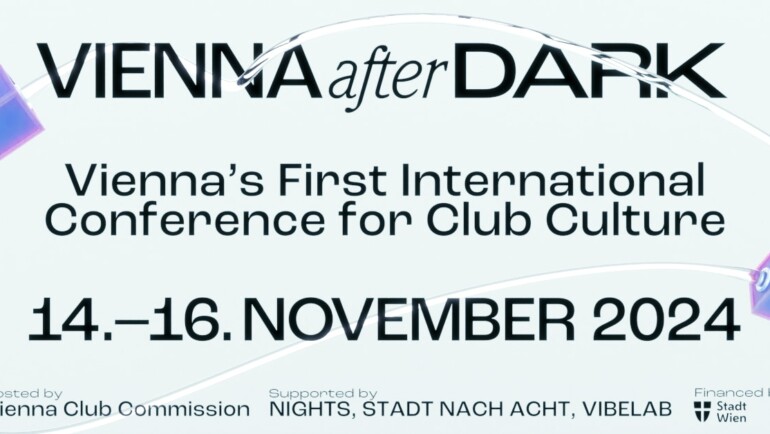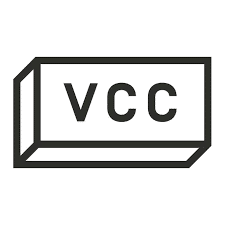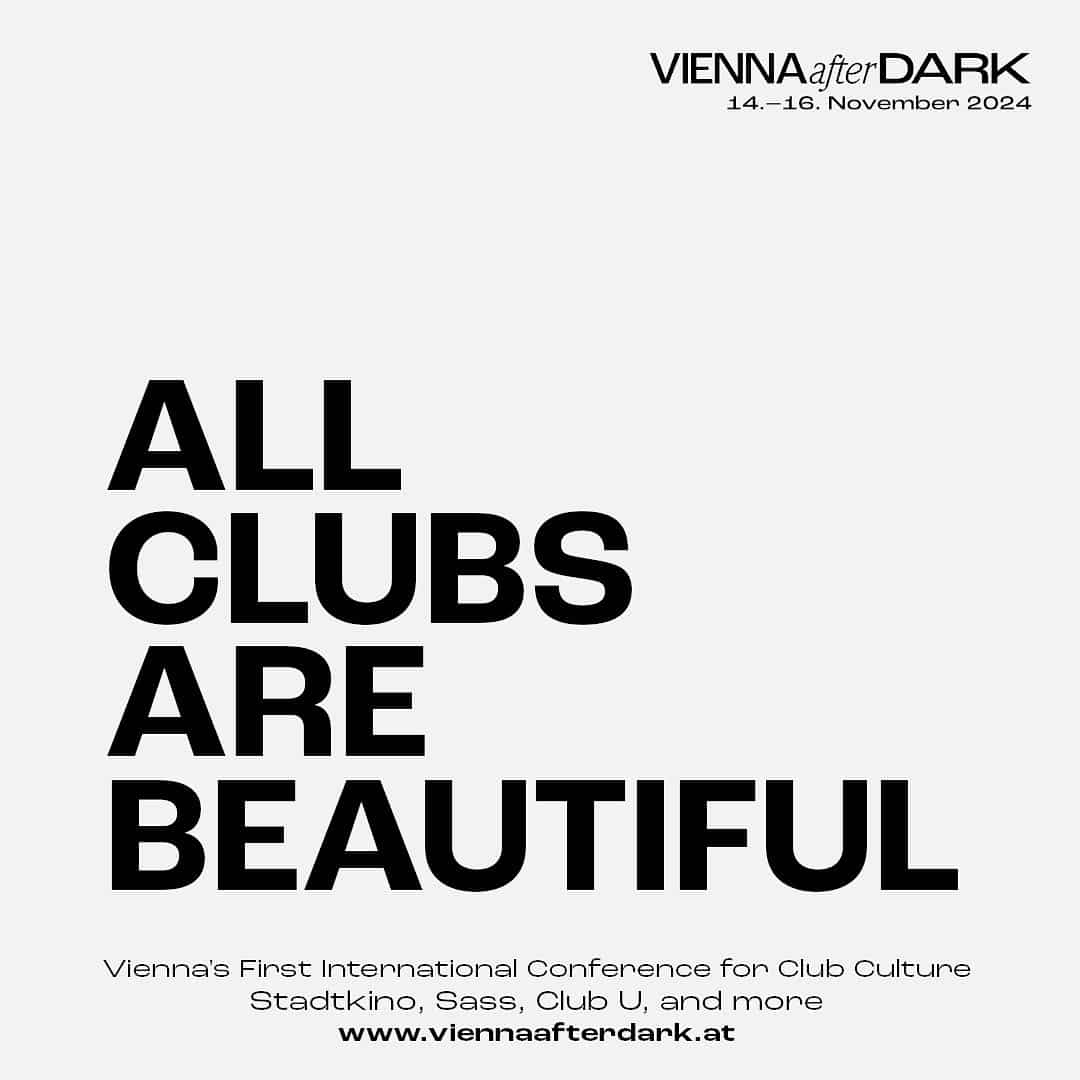
VIENNA AFTER DARK (November 14-16, 2024) – the programme of the first international conference on club culture is online! To highlight the connection between Vienna’s high culture and club culture, some of Vienna’s beloved clubs will be transformed into the main locations of the conference, while satellite events will take place in clubs across the city. The programme features over 30 keynotes, panel discussions, workshops, networking meetings, and excursions through Vienna’s nightlife. More than 125 speakers from over 15 countries will be invited to discuss the social, cultural, and economic relevance of club culture.

For the first time, the Vienna Club Commission is organising a conference that intensively addresses topics related to nightlife and club culture in an international context. This was made possible through collaboration with internationally renowned partner organisations NIGHTS, STADT NACH ACHT, and VIBELAB, as well as six co-curators from the local club and event scene, making Vienna the hotspot of global club culture for three days.
More than 30 keynotes, panel discussions, workshops, networking meetings, and excursions through Vienna’s nightlife are on the agenda. Over 125 speakers from more than 15 countries will bring solutions to Vienna, reinforcing the social, cultural, and economic relevance of club culture for our cities. On Thursday and Friday, the Stadtkino, Club U, Sass, Schikaneder, and Salon im Künstlerhaus will serve as the conference hub.
Additionally, satellite events will be organised throughout the city, such as at the club and event venues Rhiz, Tagada, FLUCC, LOT, Praterstrasse, FLEX, Ponyhof, and 4lthangrund.
Clubs Between Cultural Mandate, Bureaucracy, and Commerce
COVID-19, inflation, changing audience behavior, and consequently rising operational costs, higher rents, and increased fees are putting many clubs and live music venues under increasing pressure, alongside gentrification and noise conflicts. Additionally, club culture receives a smaller budget for funding compared to high culture. Strict regulatory requirements further complicate the opening of new clubs and the implementation of events. Reports of several club closures in Berlin raise the question: are we facing a club extinction in Vienna in the next ten years? If so, how can we counteract this to maintain a vibrant and diverse club culture that is essential for the social fabric and attractiveness of our cities?
We expect insightful inputs from the following speakers:
Pamela Schobeß from Berlin’s “Club Gretchen” and political spokesperson on the executive board of the Federal Association for Music Venues LiveKomm; Sophie Brownlee from Music Venue Trust – an organisation that advocates for the protection, security, and improvement of grassroots music venues in the UK; Nadja Clarus from the Berlin Senate Department for Economic Affairs, who developed the funding programme “Soundproofing in Clubs” in 2018; Katharin Ahrend from the Berlin Clubcommission, who leads the award and showcase festival “Day of Club Culture”; Simon Hafner from IG Kultur, advocating for minimum standards of fair pay for cultural work and developing salary and fee guidelines.
Conference Formats on the Topic:
- Thursday, 14.11.2024
- Beyond Streaming Fatalism: A Few Ideas for an Actually Independent Music Ecosystem
- Strategies to Protect Clubs and Cultural Venues From Gentrification
Greener Nightlife: How Can Nightlife Become CO₂-Neutral?
- Friday, 15.11.2024
- Who Should Get Paid and How Much?
Potentials for Club Cultural Development
In light of rising costs for club infrastructures, organisers are increasingly confronted with the challenge to find new and creative solutions for club spaces. Whether through interim uses, open-air events in public spaces, or unusual locations like water-based venues, the future of club culture demands new ideas and structures. The inclusion of club culture in the planning of new construction projects should also be seen as an opportunity to create new venues. What conditions are needed to allow for club cultural freedom and collective experiences?
What potentials arise from the absence of a closing time or the use of 24-hour licenses to create new opportunities for staff, revenue, and programming? We will address the question of how to find the right balance between regulation and artistic freedom, and whether recognition by institutions like UNESCO can help reduce stigmatisation and promote a sustainable, vibrant club culture.
We expect insightful inputs from the following speakers:
Aukje Dekker from Sexyland World – one of the only collaborative clubs in Amsterdam; Konstantin Krex, who shaped the Berlin Holzmarkt 25 project as a cultural interim use for ten years; Catharine Rossi, a design historian who curated the exhibition “Night Fever: Designing Club Culture 1960 to Today (Vitra Design Museum, 2018)”; Frederik Böhm from Berlin’s “Ritter Butzke” club, demonstrating how a club operates without a closing time; Karoline Lucks from the Fusion Festival; Steven Raspa from the Burning Man Festival.
Conference Formats on the Topic:
- Thursday, 14.11.2024
- Friday, 15.11.2024
- Making Space(s) for Club Culture – What’s Left, What do we Long for?
- Creative Anarchy: Pushing the Boundaries of Club and Festival Experiences
- Aesthetics of Club Culture
- The Impact of Curfew-Free Club Culture
- Unspoken dialogue between dance and music
- Elaborating Club Culture Manifests, Visions, and Agendas
- International Matchmaking Funding Program
- Creatives for Vienna – Making Spaces Förderprogramm
- The Potential of Recognising Club Culture

Club Culture for Democracy, Diversity, and Inclusion
In light of the rise of right-wing populist and extremist parties and movements, as well as increasing discriminatory behaviour within society, it is more important than ever to examine the role of clubs as places of social participation. Addressing racism and discrimination in club culture also opens up opportunities to acknowledge the origins and contributions of QTI*BIPoC communities and to create dance floors as safer spaces for all. What approaches can we take to break down barriers and create inclusive environments?
It is essential to address the issue of sexualised violence within our ranks. What role do education and collective action play in this process? How can we support active members of the club culture scene and amplify their progressive commitment to democratic values, inspiring broader society?
We expect insightful inputs from the following speakers:
Naja Orashvili, co-founder of the “Bassiani” club in Tbilisi; Andrii Yankovskyi from Kyiv’s first association for promoting nightlife “UNight”; Dimitri Hegemann, founder of the Berlin club “Tresor”; Roman Samotný, founder of Tepláreň/Queer Slovakia; Paulette Constable, aka DJ Paulette, winner of the DJ Mag Top 100 Lifetime Achievement Award and author of “Welcome to the Club”; Marieke Samallo, founder of the Milkshake Festival and founder and chair of the For All Who Love Foundation.
Conference Formats on the Topic:
- Thursday, 14.11.2024
- Vote Club Culture – How Club Culture Strengthens Democracy and Counteracts Fascism
- “Welcome to the Club” by DJ Paulette
- This is Our House – on Creating Safe(r) Spaces for QTI*BIPoC in Club Culture
- Row Zero – Machtmissbrauch und sexualisierte Gewalt in der Musikindustrie
- Friday, 15.11.2024
Awareness Standards, Substance Use, and Mental Health
In a time when safety in club culture is becoming increasingly important, Vienna could become the first city worldwide to bring the topic of awareness into event legislation.
But what specific awareness measures do the varying club and event settings require, and how can these be effectively integrated into operations without running the risk of awareness-washing? At the same time, the high demands and irregular working hours in nightlife present challenges for the mental health of employees. Clubs as places of excessive hedonism also encourage the consumption of various substances, requiring reality-based regulatory models. How can we address these challenges and develop practical solutions to ensure the safety and well-being of all involved?
We expect insightful inputs from the following speakers:
Pavel Bém from the Global Commission on Drug Policy; Karl Verboten, founder of the pro-pervert event series “Klub Verboten”; Carly Heath from Bristol, who introduced the first city-wide harm reduction policy in the UK; Peter Hacker, Vienna’s health councillor, who will speak about the establishment of checkit!.
Conference Formats on the Topic
- Thursday, 14.11.2024
- Friday, 15.11.2024
- Mental Health and Nighttime Industry
- Feminism and Harm Reduction
- Mental Health and Clubbing (pre and after party care)
- Vienna’s Drug Checking History
Science for Club Culture
Over 45 academics have submitted their research projects for the NIGHT(S)-Science Call – an impressive sign of the growing interest in research related to nightlife and club culture! These projects have been carefully reviewed by an international scientific committee. An exclusive selection of alumni will present their most exciting findings alongside established researchers at the conference.
Insightful inputs are expected from the following speakers:
William Straw, an award-winning scholar and professor of Urban Media Studies at McGill University (Montréal), who edited “Night Studies: Perspectives on the New Faces of the Night”; Andreina Seijas, who earned her PhD at the Harvard Graduate School of Design and focused her research on night-time governance and urban planning; Manuel Garcia Ruiz, founder and coordinator of the International Night Studies Network.
Conference Formats on the Topic:
- Thursday, November 14, 2024
- Friday, November 15, 2024
Politics in Dialogue with the Club Scene and the Role of Club Commissions
The relationship between the club scene and politics is often complex. However, since the 2000s, more than 60 cities worldwide have recognized the importance of establishing club commissions as mediators between these two worlds. These commissions ensure that the concerns of club culture are heard at the political level and that joint solutions to challenges are developed.
A special highlight at the opening of the Vienna After Dark conference will be the appearance of representatives from ten cities, who will present their approaches to valuing the club scene in their own city in a Pecha Kucha format at 11:30 A.M. at Stadtkino.
The aim of the Vienna After Dark conference is to further strengthen collaboration and deepen the exchange between politics and the club scene. Various formats will also feature city representatives, who will engage in dialogue with the club scene to jointly shape the future of urban nightlife.
Insightful inputs are expected from the following speakers:
Mirik Milan, one of the world’s first night mayors; Alexander Bücheli, from the Bar & Club Commission Zurich; Mathieu Grondin, the first night mayor in Canada; Sasha Ojeda Mendoza, night culture advisor to the deputy mayor for arts and culture in Amsterdam; Thys Boer, founder and chair of the independent Night Council Rotterdam; Michael Rodrigues, head of the 24-Hour Economy Office in NSW – Sydney; Martina Brunner, managing director of the Vienna Club Commission; Veronica Kaup-Hasler, Vienna’s cultural city councillor.
Conference Formats on the Topic
- Thursday, November 14, 2024
Excursions, Practice, and Network Club Culture
Club culture thrives on shared practice and a strong network, which is why the discourse program is complemented by workshops and networking events.
Insightful inputs are expected from the following speakers:
Peter Rantaša, founder and operator of the club Rhiz; Marlene Engel, founder of the Hyperreality Festival and curator of the music program at the Volksbühne Berlin; Michail Stangl, booker for the CTM Festival; Susanne Kirchmayr, also known as Electric Indigo.
Conference Formats on the Topic:
- Thursday, November 14, 2024
- Friday, November 15, 2024
Booker’s Lab
- Saturday, November 16, 2024
Special Treat Club Culture
A special highlight of the Vienna After Dark conference will be the presentation of the program “International Club Culture Matchmaking Funding Programme,” funded by the BMKÖS. This program connects nine club cultural formations from Austria with clubs in other European cities to co-design a club night in the selected partner cities. A total of 45 actors from the Austrian club culture will be funded, including 27 DJs, 9 clubs, and 9 organisers. This not only strengthens the local club scene but also promotes European exchange in the club context.
Conference Formats on the Topic:
- Friday, November 15, 2024
- International Club Culture Matchmaking Funding Programme
Saturday, November 16, 2024 – VCC Empowering Community Day
In addition to the conference program on Thursday and Friday (November 14-15), Saturday (November 16) will feature satellite events throughout the city, aimed at both conference participants and anyone interested in nightlife-related topics. No ticket is required for this day; however, capacity for the various formats is limited and registration is necessary.
Tickets
Secure your tickets via various ticketing options and see you there!
